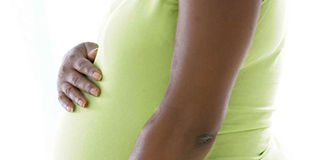Prevent maternal deaths during pandemic

The curfew, and even movement restrictions, will further jeopardise the health and well-being of expectant mothers. PHOTO | FILE | NATION MEDIA GROUP
What you need to know:
- There is also a need to strengthen the delivery of health services and other social services and amenities to support pregnant women.
One of the many pointers to increased maternal deaths amid the Covid-19 pandemic is the recent killing of Hamisi Juma Idd, allegedly by the police.
Idd succumbed to gunshot injuries on the first day of the dusk-to-dawn curfew.
I can imagine Juma, like many other citizens, planned to be home at 7pm. However, as is expected, pregnancy-related emergencies are just that — emergencies.
They happen anywhere, anytime, and this was no different for the lady that Juma was rushing to hospital.
Statistics show maternal deaths largely result from pregnancy-related complications. Limited availability of healthcare services and low access to skilled care during childbirth are among the major risks pregnant women in Kenya face.
The delivery period is as fragile as the postnatal period, and it is not unusual to lose the lives of mothers who left the hospital while okay.
One wonders what is happening to pregnant women with the onset of the deadly coronavirus. Is the health and safety of these women a priority at all, given the shortcomings of the healthcare system?
MEDICAL ATTENTION
According to the National Council for Population and Development, maternal mortality has remained high, at 400-600 deaths per 100,000 live births.
The rate varies across counties, with the northeastern region recording over 2,000 deaths per 100,000 live births, way above the national average.
And now, all efforts and resources (human and financial) are directed at the coronavirus. The situation is likely to be worse for pregnant women who catch the virus.
The curfew, and even movement restrictions, will further jeopardise the health and well-being of expectant mothers. When the police indiscriminately descend on people caught up in the melee, they have no regard of one’s status.
As witnessed in Likoni on Curfew Day One, pregnant women were not spared the pain, risk and humiliation meted out on other people; never mind it was over two hours away.
Are pregnant women allowed to seek medical attention in case of a complication? More often than not, such complications, and even the onset of delivery, do not respect time.
To minimise the risk of infection, the implementation of such an order or policy should be done humanely, even when the enforcers are confronted with large crowds.
BOLSTER SERVICES
Are police officers or any other unit enforcing such orders not given training or sensitisation on how to engage with and handle pregnant women and others who may need support?
The implementation cannot be a one-size-fits-all affair; it must allow for the few genuine cases, who should be heard before determination of the course of action, but certainly not indiscriminate beatings that jeopardise the citizens’ health.
There is also a need to strengthen the delivery of health services and other social services and amenities to support pregnant women.
This may include access to community health workers, who can monitor and support pregnant mothers, prenatal services, basic needs such as food and essential social services like water and sanitation in their locality.
Juma must have decided, against all odds, to save the lives of the woman and her unborn child. Ironically, the Covid-19 war is driven by the need to save lives, yet he lost his doing exactly that — saving lives.
Ms Mudora is a social justice and human rights advocate; [email protected].




